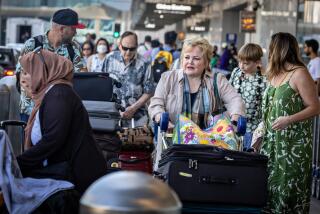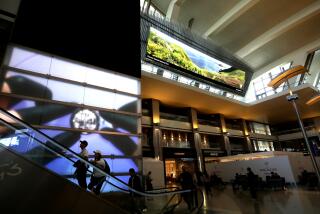Op-Ed: Let’s name long TSA lines after the politicians who caused them
- Share via
Naming anything after a living politician is usually a bad idea, but this summer, we can make an exception. Now that Americans will be spending much of their vacations waiting in security lines at airports, we should honor the public servants responsible. At the entrance to the checkpoint at LAX, let’s install a bronze plaque proclaiming it the Sen. Dianne Feinstein Line. Similar monuments can be installed at JFK for Hillary Clinton, at the Phoenix airport for John McCain, and at the home airports of all the other senators who voted to create the Transportation Security Administration.
Even by D.C. standards, the creation of the TSA was a blunder of colossal proportions. Citing the lapse in security on Sept. 11, politicos claimed that a new federal agency was needed to replace the private security companies that had been screening passengers for airlines. Never mind that the screeners were innocent of blame for the terrorist attacks.
It was the federal government, not the private screeners, that set the policy allowing small knives and box cutters to be brought onto planes. Federal guidelines also prevented airlines from arming pilots and reinforcing cockpit doors.
Instead of learning from those mistakes, the Senate voted 99 to 0 to turn airport screening into a federal monopoly. The only intelligent deliberation occurred in the House, where Republicans actually listened to experts from countries with considerable experience in aviation terrorism. Israel and European nations had learned the hard way that good security requires a division of responsibility. An independent watchdog is essential to ensure that screeners are doing their job, and the obvious candidate for that role is the federal government. But that means that someone else has to do the screening. The watchdog can’t watch itself.
House Republicans heeded the experts’ advice, and they passed a bill to establish a system modeled on the one used in Israel, Canada and Europe: Each airport would run its own screening system, and the feds would have wide authority to set standards and mandate improvements. When it came time to reconcile the competing bills, however, Senate Democrats stood firm, and they denounced the House Republicans for putting ideology above national security.
One of the loudest critics was New York Times columnist Paul Krugman, who was such an ardent cheerleader for the TSA that he deserves to have the line at Newark airport named after him. “The right’s fanatical distrust of government is the central fact of American politics, even in a time of terror,” Krugman wrote. Exploiting the public affection for firefighters after Sept. 11, Krugman argued that the Republicans’ anti-TSA ideology would logically call for the elimination of the New York City Fire Department because fire protection should be a purely private responsibility.
This was nonsensical on several levels. None of those evil Republicans claimed that aviation security was a purely private responsibility. Besides, just because something is a public responsibility doesn’t mean that all the work must be done by public employees.
Acknowledging a government role, moreover, certainly doesn’t mean that the work must be done by a federal monopoly. One reason that Americans respect firefighters more than postal workers is that they’re not working for a one-size-fits-all bureaucracy in Washington. They’re free to adapt to local conditions.
Last year, ABC News reported that federal investigators had successfully sneaked contraband past TSA screeners on 67 of 70 attempts.
But such logic was ignored in the frenzy to do something after Sept. 11. The Bush White House caved to public pressure and promised to sign whatever bill emerged from Congress, even if it was the Democrats’ version. The Republicans won a few concessions — the TSA wouldn’t be unionized, and a few airports could experiment with their own screening systems — but the Democrats prevailed in creating another federal bureaucracy.
Soon travelers were referring to the TSA as Thousands Standing Around, and the agency has made headlines ever since for incompetence. The three-hour lines this summer are just the latest failures of a top-heavy bureaucracy (one administrator for every three screeners) and a workforce that has gotten even more unmanageable since it was unionized in 2011. (Because President Obama undid the original no-union policy, he deserves to have his name on the line at O’Hare.) Last year, ABC News reported that federal investigators had successfully sneaked contraband past TSA screeners on 67 of 70 attempts.
Predictably, the TSA blames its failures on lack of funding. But it’s already spending way too much, as demonstrated in a congressional study comparing TSA screeners in Los Angeles with non-TSA screeners in San Francisco, one of the few airports allowed to run its own system. If LAX switched to the San Francisco model, the study concluded, it could cut its screening costs by more than 40%.
The San Francisco private company’s screeners received the same salary and benefits as TSA screeners, but they were so much better trained and deployed that each one processed 65% more passengers than a TSA screener in Los Angeles. And in tests by federal investigators, they were three times better at detecting contraband.
Those results, as well as other research showing that private screeners get better ratings from passengers and airport managers, inspired congressional Republicans to pass legislation giving more airports the option of switching to private contractors. But it’s not easy to get rid of a federal monopoly, especially now that unionized screeners can intimidate local politicians — as they did in blocking an attempt to replace them at Sacramento’s airport.
Despite this formidable obstacle, the TSA has inspired so much anger that officials in Atlanta and other cities are finally considering a switch to private contractors. That change would be a boon to future travelers, but it won’t come soon enough to make any difference this summer to the huddled masses at TSA checkpoints. The best we can do for them is to erect monuments honoring the politicians who created this mess.
John Tierney is a contributing editor at the Manhattan Institute’s City Journal and coauthor of “Willpower: Rediscovering the Greatest Human Strength.” This essay was adapted from the summer issue of City Journal.
Follow the Opinion section on Twitter @latimesopinion and Facebook
More to Read
A cure for the common opinion
Get thought-provoking perspectives with our weekly newsletter.
You may occasionally receive promotional content from the Los Angeles Times.










